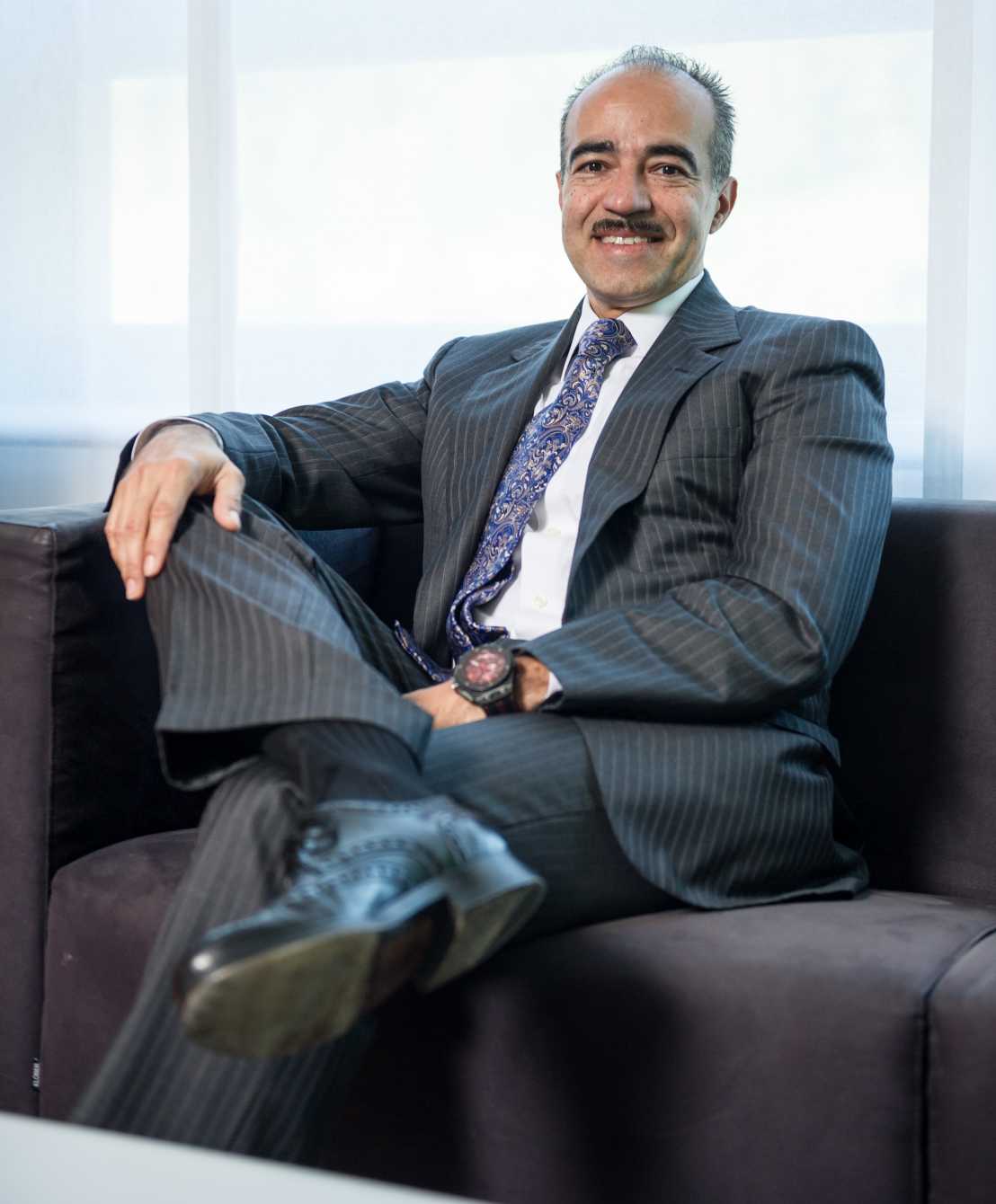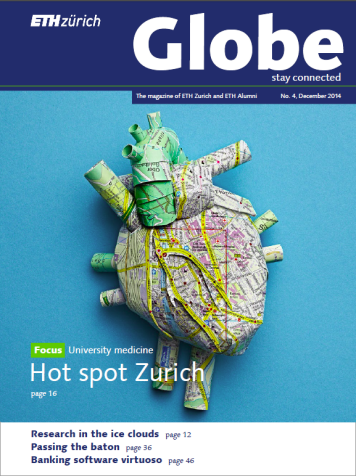Banking software virtuoso
Avaloq CEO Francisco Fernandez is bursting with ambition. Despite quadrupling his company’s turnover and staff since the beginning of the financial crisis, he refuses to rest on his laurels. His mission: a total rethink of banking, and developing the best solutions for the industry.

Francisco Fernandez’s office at Avaloq’s Zurich headquarters is split into two: a partial wall separates the business section, where a well-used flipchart stands and diagrams hang on the wall, from the musical half, which is completely filled by a black grand piano. From time to time, the company head sits down at the instrument to let off steam. The divided office is also a reminder of one of the most important decisions that Fernandez had to make as a young school-leaver and gifted pianist: Should he pursue a career as a jazz musician or set his sights on IT engineering?
Fernandez opted for the latter, studying computer science at ETH Zurich, then business administration, before developing a banking software program shortly afterwards that is well on the way to becoming the industry standard.
“I knew immediately: there had to be a better way.”Francisco Fernandez
The first thing I want to know during our conversation is what a typical working day looks like for a CEO whose turnover and workforce have quadrupled in the last six years – and who today is in charge of 1,600 employees in 20 countries. Fernandez lays a print-out from his diary on the table. There are 13 meetings scheduled for today: to discuss personnel development, corporate strategy, marketing, research and development. He probably won’t be home until after midnight again – like last night. “When Avaloq was founded, I assured my wife that it would only be like this in the early days. That was almost 20 years ago”, he says.
The reason why he is so busy: “Avaloq is right at the heart of an industry that has changed radically since the financial crisis.” In the medium term, the near-collapse of the financial system in 2008 actually turned out to be a unique opportunity: “It’s a bit like the aftermath of the crisis in the Swiss watch industry”, explains the Avaloq CEO. “We need to completely reinvent banking – and Avaloq is in the eye of the hurricane.” Fernandez goes on to mention Swatch boss Nicolas Hayek several times during the interview. They both hail from successful immigrant families (Fernandez’s parents originally came from Spain to work in Switzerland). And they also share a passionate entrepreneurial spirit with the ambition of revolutionising an entire industry.
Avaloq’s current success still feeds off an insight which the fresh ETH graduate gained at BZ Bank back in the early 1990s. He had just completed his degree and got talking to representatives of the bank at a contact event: “They were looking for 20 computer scientists for a banking team of 15 people. I thought that was quite interesting.” Fernandez began to write financial mathematics programs for pricing derivatives. Three years later, he embarked on a project that would change his life: the quest to find a suitable IT processing system that could cope with the bank’s increasing IT demands. An international best-practice search left him disillusioned: “Back then, over 90 percentper cent of banks were building their own software – unsophisticated individual solutions with terrible software architectures.” What he saw there had nothing to do with what he had learnt at ETH Zurich. “I knew immediately: there had to be a better way, and there was a tremendous amount of market potential.” After a management buy-out of BZ Informatik in 1991, Fernandez became an entrepreneur virtually overnight. Between 1994 and 1997, his four-strong team developed an initial software solution for the Swiss banking industry. In 2001 the company changed its name to Avaloq and from 2005 onwards expanded on the international market with a branch apiece in Luxembourg and Singapore. Then the financial crisis hit.
After many banks all but crashed, banking became more labour-intensive and expensive; margins shrank. The new regulations meant a lot of work, while client requirements continued to increase. This suited Avaloq’s offering perfectly: ever since, the automation and standardisation of business processes have been vital for survival rather than just a good option. The Avaloq Banking Suite is in use at 150 banks. Over 3 billion Swiss francs are handled in wealth management alone. ”This gives us the opportunity to create a de facto standard in banking IT together with our customers and partners”, says Fernandez. Then there is the fact that the bank regulations have become harsher, more complicated and more nation-based: “Today, when customer consultants sell bank products globally, it’s virtually impossible for them to know off by heart all the rules for the different national jurisdictions. They need intelligent software to help them.”
“We’d love to hire even more ETH graduates.”Francisco Fernandez
Bei Avaloq setzen sich heute 45 Spezialisten allein mit der Steuerproblematik der unterschiedlichen Märkte auseinander. Die meisten At Avaloq, 45 specialists currently deal with the tax problems of the different markets alone. Most do not come from the financial sector, however, but are engineers instead. “Often, engineers are well-versed in legal and bank-related issues. Anyone who programs financial services has to understand the business right down to the last bit.” Fernandez also draws a distinction between programmers and engineers. “One receives solutions and implements them, the other thinks analytically and invents new solutions.”
To this day, ETH Zurich remains a valuable source of talented people who can do just that, he explains: “We’d love to hire even more ETH graduates. But we have to share the computer scientists with banks and IT companies.” This was one of the reasons behind the decision to set up an additional research and development centre in Edinburgh. Zurich remains a key location and Fernandez still enjoys close ties with ETH Zurich. He is on the external page ETH Zurich Foundation’s Board of Trustees, advises young entrepreneurs as a “business angel” and also supports the university as a donor: “Especially coming from an immigrant background, I feel a profound sense of gratitude for the opportunity that ETH Zurich gave me.”
At Avaloq, the course is set for further growth. The company recently announced a joint venture with Raiffeisen Bank and the assumption of outsourcing services for Deutsche Bank in Singapore. A turnover of around half a billion francs has been budgeted for 2014. At such dizzying heights of success, isn’t Fernandez afraid that he might one day come crashing back down to Earth? “Constantly”, he freely admits. That’s why he is always on his toes, never settles for the status quo and strives to drive himself and his people out of their comfort zones. For him, this is all part and parcel of an entrepreneur’s creativity – just like a jazz musician’s.
Sometimes, when Fernandez listens to the Chinese pianist Lang Lang playing Chopin at the KKL in Lucerne or to the Dominican Latin jazz pianist Michel Camillo in a club, he dreams of being back on stage himself, and of having opted for a music career over 30 years ago. But he doesn’t have any regrets, Fernandez stresses: “I might still embark on a career in the music business when I’m 65 – perhaps as a producer.”
About Francisco Fernandez
Francisco Fernandez (51) has Spanish roots and grew up in Lucerne. He studied computer science at ETH Zurich and business studies at ETH Zurich’s Center for Industrial Management (BWI). Today he is CEO of the Avaloq Group, which develops software solutions for the banking industry and provides related business process outsourcing services.
Read more

This article has been published in Globe, no. 4/
December 2014:
Download the PDF or subscribe to the print magazine.
All online available articles
Comments
No comments yet